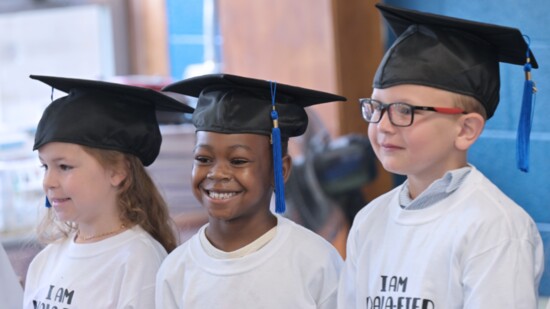“You feel it the moment you walk in this building,” says Mount Clemens Montessori Academy’s principal Ashley Lesage.
“This school is something different.”
Charters allow parents to make decisions about their children’s education. Mount Clemens Montessori Academy wants to stand out to parents who want a more customizable environment for their children.
“The Montessori philosophy is to follow the child’s individual needs, with individualized attention, meeting the kids where they are," says Mrs. Lesage. "For example, in kindergarten, if one student comes in knowing zero letters, and another student comes in reading, the teachers are going to differentiate for them. They will do the group lesson together, but when they meet with them individually, they're going to allow them to learn at their own speed.”
The customization goes beyond what the children learn. Montessori focuses on the way children learn.
“We had a boy who was interested in nothing academically," says Mrs. Lesage, "but he was super into cars. So, in preschool, they made counting, one through five, out of cars for him. So that little boy would actually do the learning with his cars. The teachers put hours and hours into making sure that these kids are getting where they're supposed to be.”
As much as Montessori’s philosophy is to customize education, Mrs. Lesage says the end result is the same for all children.
“We want to create a sense of internal motivation. You're doing things for yourself, to make yourself proud, to be independent. We try not to say, ‘I'm proud of you.’ Instead, it’s ‘You must be really proud of yourself. Look at what you did.’ It makes the kids find their own happiness with the things they are learning."
Mrs. Lesage explains that Mount Clemens Montessori Academy is a Restorative Practices school. Restorative Practices focus on resolving conflict, repairing harm, and healing relationships. The psychologically safe climate these practices create prevents bullying and reduces disciplinary incidents.
“It's being able to say, 'Listen, I hurt this person. I understand. I did this. And here's how we're going to fix it.’"
Learning from mistakes is at the center of Restorative Practices. In her first year at the school, Mrs. Lesage recalls two fifth grade girls coming to her office because of a disagreement.
“The way they spoke to each other was at a higher level of respect and understanding than the middle school I came from. And they were in fifth grade.”
“I remember sitting there after they left for a few minutes and saying to myself, ‘Holy cow.’ The way that I just kind of sat back and let them handle the conversation with respect and understanding. It was amazing. I'm getting chills thinking about it.”
I’m impressed with the psychosocial aspects of the school. I want to know what the classrooms are like.
“When you walk in, you see these students all doing different things. But they are all doing different things for a reason. They get a checklist, and they need to grab their different Works and make sure they do all the different Works. All of their Works go together."
What are Works?
“Works are centers or activities. At the beginning of the year, their classrooms are empty. They build the classroom together, with one or two Works a day, so that the students get the ownership of their classroom. Each classroom has probably 30 Works out at a time.”
I ask Mrs. Lesage for some examples of Works.
“One preschool Work is these little rods that are magnetic. So that's a science Work. They can just play with it, trying to understand magnetic force: do they connect on this side or that side?”
I wonder if children from other schools would find the Montessori atmosphere unusual. Mrs. Lesage says with a smile that they're often uncomfortable with the freedom at Montessori, at first.
“When we have a new student coming in, say the new student's waiting for snack time—well, we don't really have snack time. If you're hungry, grab your snack.”
Mrs. Lesage says Montessori enrollment is 80 percent based on word of mouth.
“If someone says on a Facebook group, ‘Just moved in the area—where should we go to school?’ 40 of our parents will comment on there to advocate for us.”
Whatever it is Mrs. Lesage feels at Mount Clemens Montessori Academy, she says parents will feel it too.
“We may not be for everyone. That’s why I always say, ‘Come to the building.’ You'll know in a matter of five minutes whether this is the place for your family. Visit, and just go with your gut and your feelings."
That’s what Mrs. Lesage did. Her oldest son attended Montessori, and her youngest just finished preschool. Mrs. Lesage tells me most Montessori instructors enroll their own children here.
Teacher Allison Klemm brings both of her sons to school with her.
“It’s a 40-minute commute for them," Mrs. Klemm says. "But MCMA understands that all students learn in a different way, different pace, and have different needs. And as a teacher, being given freedoms to find the best ways to deliver instruction to my students is special. It’s what keeps me wanting to teach here.”
It’s not simply the teachers who keep returning, Mrs. Lesage tells me.
“We probably had nine seniors last year come back, high school seniors. They had their caps and gowns and they walked through our halls for one last time and we clapped them out.”
I had actual goosebumps, imagining their former school mattering that much to someone.
So now I understand Montessori’s philosophy. But before we’re done, I ask Mrs. Lesage what Montessori’s goal is with their children. Mrs. Lesage doesn’t hesitate.
“To develop them into people that will be able to choose to do something that matters to them, and be successful, and make a difference. You know…those good kind of humans.”
We don't say ‘I'm proud of you.’ Instead it’s ‘You must be proud of yourself.'
